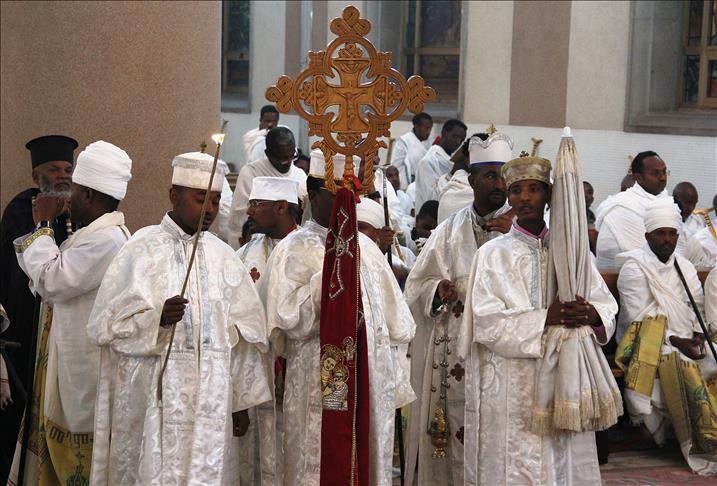
By Abebech Tamene
ADDIS ABABA
Ethiopian Orthodox Christians celebrated Christmas on Wednesday – along with other Eastern Orthodox Christians around the world – on Jan. 7, some two weeks after December 25, when their Western counterparts celebrate Jesus' birth.
"Celebrating Christmas on this day [Jan. 7] makes our church unique," Abba Haile Mariam Melese, the church's deputy general manager, told The Anadolu Agency.
Two main versions of the Christian calendar are currently in use around the world – the Julian calendar and the Gregorian calendar. The Ethiopian Orthodox Church, for its part, uses the latter, introduced by Julius Caesar in 46 B.C.
The difference between the two calendars lies in the way they estimate the length of the tropical year, and how they calculate when Easter falls.
"The [Ethiopian] church follows the Julian calendar because it believes it is the most appropriate for counting days and years," Melese told AA. "Besides, the Julian calendar is derived from the Bible; it is not good to deviate from it when counting days and years."
Late Tuesday, nighttime masses were conducted at churches across the country. At dawn, a cannon was fired nine times to mark the occasion.
Ethiopia adheres to its ancient calendar, which is seven or eight years behind the western (Gregorian) calendar. Its New Year, Melese noted, falls in September.
In the Ethiopian calendar, one year consists of 365 days. The Ethiopian New Year begins on September 11 (or 12 on a leap year). Each year is named after one of the four Christian Evangelists: Mathew, Mark, Luke and John.
Each year is divided into 12 months, which have 30 days each. The five remaining days all come at the end of the year and are collectively known as "Pagume." On leap years, an extra day is added, making for a six-day Pagume.
In urban areas, people exchange specially designed Christmas cards and holiday greetings. Some exchange gifts.
Most families get together for lunch or dinner to celebrate Christmas, which is generally preceded by a 40-day fast.
-Food for the day-
Bethlehem, a 38-year-old Addis Ababa resident, told AA that she celebrated Christmas in a way that combined Ethiopian and western traditions.
"My daughters, aged six and two, are eager to have a Christmas tree at home. I say it isn't an Ethiopian tradition, but they don't accept this. So I have no choice but to get them a tree," she said.
"There are different kinds of sweets, including chocolates and biscuits, with which the children enjoy Christmas," she added.
During the holidays, instead of buying beef from butchers, most Ethiopians opt to form a group of ten or 12 persons to pitch in for an ox. They slaughter the bovine and divide the meat – called "Kircha" in Amharic – equally among themselves.
Traditional Christmas food also includes Doro Wat, a spicy chicken stew with boiled eggs, and Injera, flat bread made of teff (a staple Ethiopian food). Home-made beverages, such as Tej and Tella, are also frequently served.
"For Christmas, I prefer Kircha, not Doro Wot," Bethlehem said. "I have already prepared spiced butter and wheat flour."
"Our traditional coffee ceremony, accompanied by different snacks such as popcorn, also adds color to the holiday and makes my home sweeter," she said.
For her part, Asselefech, an 80-year-old widow, told AA that what she enjoyed most at Christmas was seeing her family, especially now that her husband was gone.
"My children and grandchildren, including in-laws, gather at my house to celebrate Christmas. I always thank God because I'm happy with the children," she said.
"I invite my neighbors for lunch and coffee and they invite me to join them for dinner. We chat and talk about the old days – I can't tell you how happy we feel," she added.
"The children sing and dance together. Christmas! What a happy day!" the widow exclaimed.
After breakfast and coffee is served, especially in the rural parts of Ethiopia, men and boys play a traditional game, which is similar to hockey but is played with a curved stick and wooden ball.
After Christmas, Ethiopian Christians prepare for a three-day celebration of the Feast of Epiphany, locally known as "Timket," which commemorates Jesus' baptism.
Anadolu Agency website contains only a portion of the news stories offered to subscribers in the AA News Broadcasting System (HAS), and in summarized form. Please contact us for subscription options.




